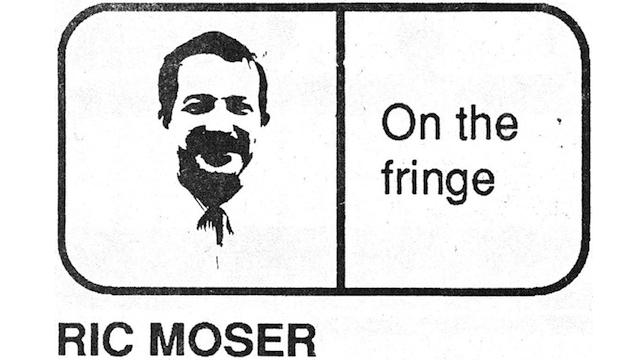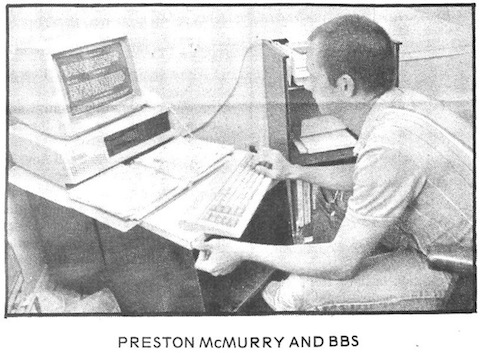
The fan on my computer whistled quietly as the letters slowly formed on the monitor screen … “First name,” it asked.
Dutifully I typed in my response.
“Last name,” it prompted. I responded.
“Your name is Ric Moser. Y or N.” I typed in a “Y.”
“Password,” it asked. I responded with a codeword I had previously selected.
As I hit the return on the keyboard, the computer began spewing letters across the screen. “Welcome to the Devil’s Advocate.”
The Devil’s Advocate is a computer bulletin board service, or BBS. It caters to computer users in the Flagstaff area who want to trade tips with like-minded individuals. It also offers a variety of utility and games programs which can be copied.
The board, as its users affectionately refer to the BBS, has a myriad of special interest areas. If you like arts and entertainment, users offer reviews and comments of everything from movies to records and beyond. The same goes for science fiction, games, fantasy football and a half-dozen other areas. Some of the messages left in these areas are “echoed,” i.e. picked up by other BBS operators across the country — in fact, throughout the world. As many as 6,000 BBSs electronically share files, calling the network every day to pick up the files.
It also contains bulletins explaining the etiquette of using the board and a file called H)appy faces. Happy faces are shorthand to put an emotional response across without wasting a lot of keystrokes. For example, ![]() is a happy face — a smile if you will. Conversely,
is a happy face — a smile if you will. Conversely, ![]() is a sad face. You get the idea.
is a sad face. You get the idea.
The Devil’s Advocate is run by its sysop (computerese for system operator), Preston McMurry, a senior in broadcast journalism at Northern Arizona University. His assistant sysop does double-duty as his girlfriend.
If you want to talk to Preston and you don’t have a computer, you may have an insurmountable problem. You see, Preston only has one phone line into his apartment and his computer is almost always connected to it. If you call, all you get is a high pitched squeal.
I had arranged to talk to Preston via computer several days before, so he was expecting me.
“chat: start” spilled onto the screen a letter at a time.
“Hi, Ric,” he typed.
After a few preliminaries, Preston explained his entry into the world of the BBS.
“I got my first computer in 1983. I didn’t have a clue and got rid of it a few months later … I bought another one in 1985 (after taking some computer classes). I was aware at the time that such things as BBSs existed, though I had never seen one. So, with some fortuitous foresight, I bought a modem at the same time.”
McMurry became involved with a BBS at NAU and a private BBS in town called NEXUS. He liked what he saw and soon took the leap to start his own. He has been operational since February.

NEXUS and The Devil’s Advocate are the only two boards in town and they cooperate with each other.
“NEXUS picks up the echoes for me. Linda Murphy, the sysop there, pays for that out of her pocket,” McMurry said.
In addition to the cost of a phone line, there can be other expenses, like picking up the echoes, he said. It is all done by electronic transmission over phone lines, but the calls are usually long distance.
One reason Murphy picks up the echoes and relays them to McMurry is because her telephone modem operates eight times as fast as his, hence lower phone rates.
“There was another board called The Cutting Board a while back. Then there is one on campus, on the new VAX machine, but it is restricted to university use,” he typed. “I have 51 users (give or take a few ) … most of whom are not active at all. I’d say there are a dozen who call occasionally, and maybe three or four who call regularly.”
One of a sysop’s biggest problems is obnoxious people, McMurry says. They leave crude messages or “flame” someone (make personal attacks) and are never heard from again. The effect can snowball and counter-attacks can be fought via message files for months after the initially offending message was left.
Sabotage can also be a problem, but McMurry has never experienced it.
It usually takes the form of “viruses” embedded in programs which can damage other programs when run. To avoid that, McMurry isolates all programs contributed by users until he can check them out. If they pass inspection, he allows them to be copied by other board users.
“A virus won’t hurt you unless it gets into your system. The only way for it to do that is to be run. If you don’t run a new program, it just sits on a file on your disk. If you nuke the file, the virus is nuked too.”
One of McMurry’s current passions is the board game Diplomacy, which has been adapted for computer play. Board users are allowed to assume the role of a world power and negotiate with and/or attack other nations in an effort to get an upper hand.
Use of the board is free and McMurry is an advocate of the position that the more users he has, the better the board. Anyone interested in looking in on The Devil’s Advocate can call (via computer modem) 774-xxxx. NEXUS, which McMurry claims will still be operational when the sun burns out, can be reached at 526-xxxx.
If you call, tell Preston that I sent you. You won’t regret it. ![]()

Just a note to let you know I got a kick out of your posting my column from 27 years ago. Technology has made an advance or two, but much remains the same.
Wow … laugh. I was not expecting to hear from you! I agree about the more things change, the more they stay the same. I hope you don’t mind? I tried looking the article up online, but the Daily Sun archives don’t go back that far, that I could tell. If you are on twitter, or have a blog, I will link to it. Hope life has been treating you well, these last — gosh! — almost 30 years.